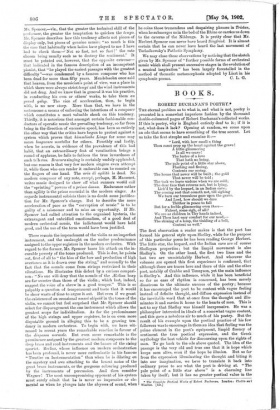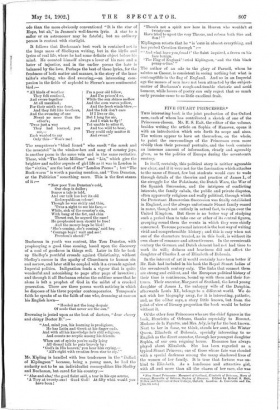BOOKS.
ROBERT BUCHANAN'S POETRY.*
THE eternal problem as to what is, and what is not, poetry . is presented in a somewhat imperious fashion by the thousand
double-columned pages of Robert Buchanan's collected works. If this is poetry, why is England entirely deaf to it ; if it is not, what does it lack ? Opening at random, we come upon an ode that seems to have something of the true accent. Let us take the first strophe and examine it :—
" Lord, with how small a thing
Thou canst prop up the heart against the grave !
A little glimmering Is all we crave !
The lustre of a love That bath no being, The pale point of a little star above, Flashing and fleeing, Contents our seeing.
The house that never will be built; the gold That never will be told ; The task we leave undone when we are cold; The dear face that returns not, but is lying, Lick'd by the leopard, in an Indian cave ; The coming rest that cometh not, till sighing We turn our tremulous gaze upon the grave.
And Lord, how should we dare Thither in peace to fall
But for a feeble glimmering even there—
Falsest, some sigh, of all ?
We are as children in Thy hands indeed,
And Thou hast easy comfort for our need,— The shining of a lamp, the tinkling of a bell,
Content us well."
The first observation a reader makes is that the poet has formed his general style upon Shelley, while for the purpose of this particular poem he has been reading George Herbert.
The little star, the leopard, and the Indian cave are of course Shelleyan properties ; but the limpid movement is also Shelley's. On the other hand, the first two lines and the last two are unmistakably Herbert. And wherever the volumes are opened this first experience is confirmed, that although there are traces here and there of this and the other poet, notably of Crabbe and Tennyson, yet the main influence is Shelley'e. And this influence, while it has been beneficial so far as ease of rhythm is concerned, has been merely disastrous to the ultimate success of the poetry ; because it has encouraged the poet to be content with vague feeling instead of definite thought, and diffuse expression instead of the inevitable word that at once fixes the thought and illu- minates it and carries it home to the hearts of men. This is not to say that Shelley was himself inexpressive. He was a philosopher interested in ideals of a somewhat vague content, and this gave a nebulous air to much of his poetry. But the result of his example upon the poetical practice of his few followers was to encourage in them an idea that feeling was the prime element in the poet's equipment, limpid fluency of sentiment the true poetical expression, and the Greek mythology the best vehicle for discoursing upon the rights of
man. To go back to the ode above quoted. The idea of the passage is the very old and true one that it is hope which keeps men alive, even if the hope be illusion. But so far from the expression illuminating the thought and biting it into our imagination, we have to translate it back into ordinary prose to see what the poet is driving at. "The pale point of a little star above" is a charming line taken by itself; but it has no greater poetical value in the • The Complete Poetical Works of Robert Buchanan. London: Matto sill Windus. [12a.]
ode than the more obviously conventional "It is the star of Hope, but ah," in Jeames's well-known lyric. A star to a sailor or an astronomer may be fateful; but no ordinary
person is content with starlight.
It follows that Buchanan's best work is contained not hi the huge mass of Shelleyan writing, but in the idylls and lyrics of real life, where he had some definite object before his mind. He counted himself always a lover of his race and a hater of injustice, and in the earlier poems the hate is balanced by the love. Perhaps the best of these lyrics, for the freshness of both matter and manner, is the story of the lame tailor's starling, who died swearing,—an interesting com-
panion in the fields of asphodel to Sterne's more sentimental bird:—
I'm a poor old fellow, And I'm prison'd so, While the sun shines mellow And the corn waves yellow,
And the fresh winds blow,—
And the folk don't care If I live or die, But I long for air, And I wish to fly !'
Yet unable to utter it, And too wild to bear, They could only mutter it And swear."
The sempstress's "blind linnet" who smelt "the musk and the muscatel" in the window-box and sang of country joys, is another poem in the same vein and in the same recitative. These, with "The Little Milliner" and "Liz," which give the
brighter and sadder aspects of girl life as it was in London in the "sixties," are the best of the" London Poems " ; but "The Book-worm" is worth a passing mention, and "Toni Dunstan, or the Politician" something more. This is the first stanza
of it:—. "Now poor Tom Dunstan's cold, Our shop is duller ; Scarce a tale is told, And our talk has lost its old Red-republican colour!
Though he was sickly and thin,
'Twas a sight to see his face,— While, sick of the country's sin, With bang of the fist, and chin
Thrust out, he argued the case! He prophesied men should be free !
And the money-bags be bled! 'She's coining, she's coming,' said he; 'Courage boys ! wait and see !
Freedom's ahead !"
Buchanan in youth was content, like Tom Dunstan, with
prophesying a good time coming, based upon the discovery of a soul of goodness in things evil. Later in life he took
up Shelley's youthful crusade against Christianity, without Shelley's excuse in the apathy of Churchmen to human sin and sorrow, and later still he coupled with it a crusade against Imperial politics. Indignation lends a vigour that is quite wonderful and astonishing to page after page of invective ; and through it all Buchanan retains the sublime sense that he alone is left a prophet of God in the midst of a crooked generation. There are three poems worth noticing in which he disposes of his three popular contemporaries. Tennyson's
faith he speaks of as the faith of one who, dreaming at ease on his English lawn—
"Heeded not the long despair
Of souls that never see the sun."
Browning is jested upon as the best of doctors, "dear cheery and chirpy Doctor B." :- "And, mind you, his learning is prodigious, He has Latin and Greek at his finger ends, And with all his knowledge he's still religious, And counts no sceptic among his friends.
When out of spirits you're sadly lying
All dismal talk he puts bravely by :
'God's in His heaven,' you hear him crying,— ' All'a right with creation from star to sty."
Mr. Kipling is handled with less tenderness in the "Ballad of Kiplingson" because, -being a young man, he had the audacity not to be an individualist cosmopolitan like Shelley and Buchanan, but cared for his country :— " Alas and alas,' the good Saint said, a tear in his eye serene, 'A Tory at twenty-one! Good God ! At fifty what would you have been "All kinds of weather
They felt confined, And swore together At all mankind ; For their mirth was done, And they felt like brothers, And the swearing of one Meant no more than the other's; 'Twas just a way They had learned, you
see,—
Each wanted to say Only this= Woe's me
There's not a spirit now here in Heaven who wouldn't at twenty-one
Have tried to upset the very Throne, and reform both Sire and Son!"
Kiplingson retorts that he "is 'cute in almost everything, and has probed Creation through" :-- "And what have you found " the Saint inquired, a frown on his face benign.
The Flag of England' ! cried Kiplingson, and the thin black penny-a-line.' "
The author of an ode to the glory of Parnell, whom he
salutes as Caesar, is consistent in seeing nothing but what is contemptible in the flag of England. And so in an Imperial age the masses of men have not been attracted by the subject- matter of Buchanan's rough-and-tumble rhetoric and acrid humour, while lovers of poetry can only regret that so much early promise came to so little excellent fruit.







































 Previous page
Previous page